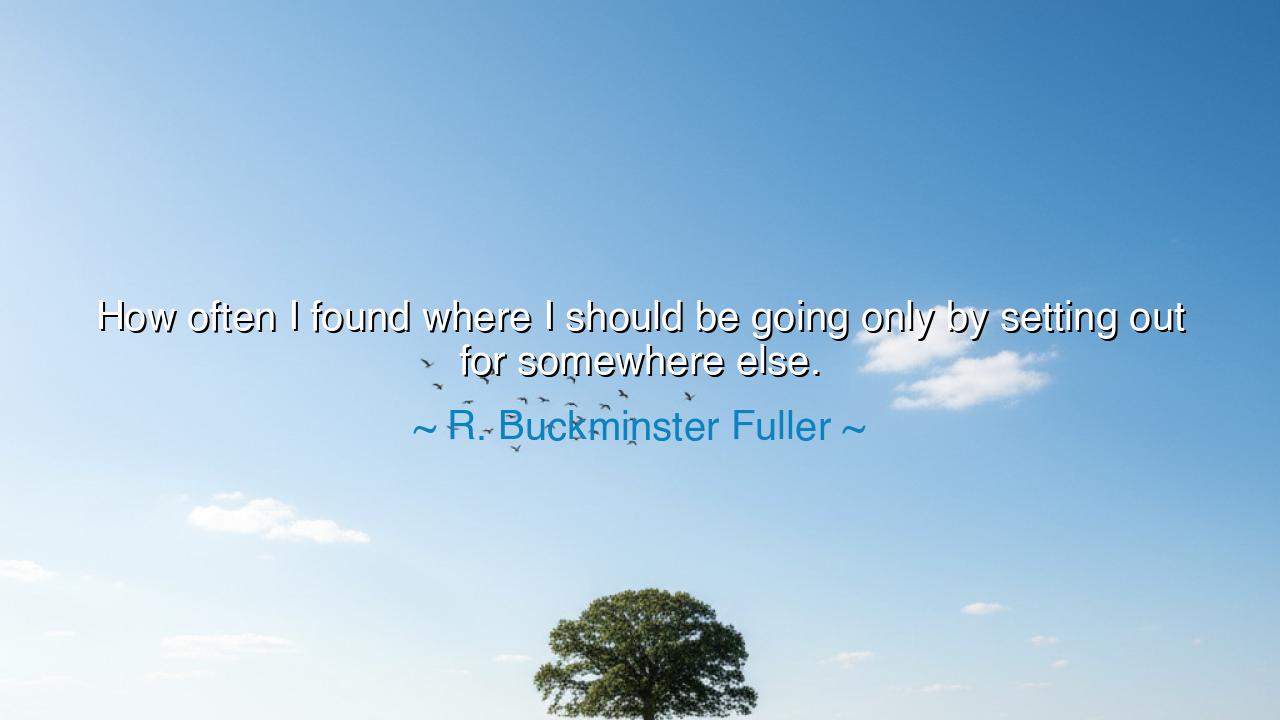
How often I found where I should be going only by setting out






Hear, O seeker of destiny, the profound words of R. Buckminster Fuller, who declared: “How often I found where I should be going only by setting out for somewhere else.” In this saying lies the eternal mystery of the human journey: that the paths we think we are walking often lead to places we never imagined, and that destiny reveals itself not in the certainty of plans, but in the courage to set out, even when the destination is unknown.
The meaning is both humble and heroic. To set forth with intention, believing we are walking toward one goal, and yet to arrive at another—that is not failure, but the hidden wisdom of life. For the universe is vast, and human vision is narrow. We see only a small arc before us, but the road twists beyond sight, leading to truths and purposes we could not foresee. Thus Fuller reminds us that the very act of going, of moving, of beginning, is what summons revelation.
The ancients themselves spoke of this paradox. Recall Odysseus, who sought only to return home to Ithaca, yet in wandering was forged into wisdom by trials of storm, cyclops, sirens, and gods. Had he sailed directly, untouched by detours, he would not have become the Odysseus of legend. So it is with every man: the true destination is often hidden in the detours. What we think is “somewhere else” may, in fact, be the very place where we were meant to arrive.
Consider also the life of Christopher Columbus. He set out seeking a passage to India, yet in error discovered the New World. His vision was flawed, his calculations mistaken, but his willingness to venture into the unknown transformed the map of the earth. Though history judges him with both honor and burden, his journey proves Fuller’s words: that often, we find what matters most not by arriving where we planned, but by embracing where the path leads us.
This truth is not confined to explorers and kings. It is the story of every life. How often has a man sought fortune, only to find friendship? How often has a woman pursued one vocation, only to discover her calling elsewhere? How often has tragedy redirected lives toward strength, compassion, or service? Fuller, the visionary inventor and thinker, knew from his own trials—having once considered ending his life, only to find his destiny in design and philosophy—that it is in setting out that we stumble upon the truest horizon.
O listener, learn this wisdom: do not fear if your plans dissolve, nor despair if your steps lead you astray. For there are no wasted journeys. Every road, even those taken in error, teaches the traveler something essential. The false destination is often the doorway to the true one. What matters most is not that you begin with perfect knowledge, but that you begin at all, with courage and openness to what the road will reveal.
Practical action follows: step forward even when uncertain. Begin the work, take the journey, embrace the opportunity, though its end is unclear. Do not be paralyzed by the need for certainty, for certainty is an illusion. Trust instead that in walking, you will discover; in striving, you will uncover; in going “somewhere else,” you will arrive at where you were truly meant to be.
Thus I say to you: Buckminster Fuller’s words are not merely reflection, but commandment. Set out, and you shall find. The road itself is the teacher, and in its turns and detours you will discover not only where you must go, but who you are meant to become.






AAdministratorAdministrator
Welcome, honored guests. Please leave a comment, we will respond soon